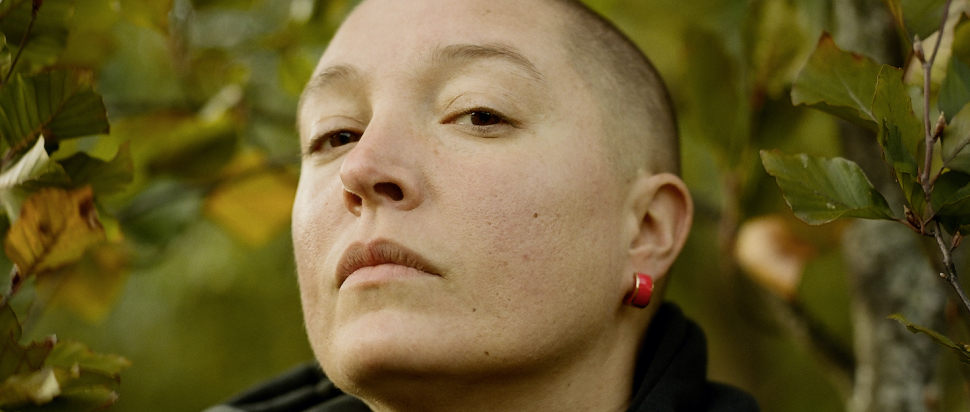K Patrick on debut poetry collection Three Births
We chat to K Patrick, named one of Granta's Best of Young British Novelists last year, about their debut poetry collection Three Births and queer bodies in and of nature
K Patrick is achingly cool – so cool that it’s easy to forget during our conversation that their past year has seen the rabid reception of their debut novel Mrs S, earning them a coveted spot on the Granta Best of Young British Novelists list. Despite all this, and their being shortlisted for the 2021 White Review Poetry Prize, they’re nothing but humble about their debut poetry collection, Three Births.
“I’ve always admired poets the most, for what they can do on the page, but I never ever thought that it would be me,” they admit, naming the mentorship on their programme at the University of Glasgow as having boosted their confidence to explore the flexibility allowed by poetry. For Patrick, poems are a vehicle for detail – where their novels aren’t rooted in a specific place or era, they say “I’m not afraid to be contemporary in that way in poetry, I couldn't tell you why that is – I think I'm still trying to figure that out for myself.”
Three Births is a heady, sprawling exploration of vulnerability and connection which follows the protagonist through a tumultuous year of marriage, divorce and growth. On the process of building the collection, they laud Granta editor Rachael Allen for helping them draw out the underlying narrative structure that had emerged unconsciously in their work. “I’m interested in the way the seasons articulate, or rearticulate, the body,” they say, and reorienting the collection around the passing of the seasons opened up new space for experiments with form and scale.
Throughout Three Births and Mrs S, Patrick places the queer body in contrast and in confluence with the natural world. Living on the remote Isle of Lewis, they describe feeling interrupted returning to cities after periods of living without the perception of others. “I think maybe that's what I love about the body within the natural, especially the queer body or the trans body,” they say on this preoccupation, “the queer rural can be a lonely place, but within that loneliness there's the potential of self articulation.”
It is not so much that Patrick writes about queerness, yet it effortlessly bubbles up through the page. Moments of recognition, community and solidarity pass between their protagonists and other queer figures, a sociality which is immediately legible to the queer reader. “I mean, it’s my life, you know?” they smile when I ask if it’s deliberate. “There’s a language that you have access to that other people don’t, a way of seeing that other people don't.” They say they’re lucky to have never felt pressured by their editors to translate themselves for a wider audience: “It's so tempting as a queer person to try and explain who you are, you know? Or to feel like you're always operating from some sort of debt, but you're not.”
While they don’t write with an audience in mind, they read throughout the writing process, and “sometimes those authors become my audience, in a way, because you have all these really complicated feelings about them. [...] I have to have an author crush while I'm writing.” This time around, their crush was their editor – unsurprising, for those familiar with the queer urge to impress your English teacher.
The week before our conversation, American writer Grace Byron analysed Mrs S in a fantastic essay on the prevalence of present tense in the often-incoherent genre that is trans fiction. When I ask if K has read it, they praise Byron’s work, saying “it's always so exciting when there's an article that knows how to take a trans text seriously [...] I find that thrilling and I was so excited to be a part of it.”
Although Three Births is playful with the passage of time, it remains mostly in present tense. When asked why they operate in this temporality when portraying the trans experience, Patrick described transness as an “identity without conclusion” – a “queer state of ongoingness” – one which “suits the present tense, because you're hyper aware of moving through the world, of how you walk, of how your voice sounds.” Writing about sex, as Patrick does so well, the present tense conveys the urgency of “two bodies trying to find each other.” They find that whilst retrospect obstructs the articulation of desire, both in sex and in the trans experience, present tense engages with the material and the sensory. “Sometimes, that kind of way of relating to the world feels truest for me.”
When our conversation turns to the future, they seem equally as grounded in the present. Having just submitted their second novel – which is, in fact, in past tense – they’re focusing on writing as much as possible while they can, and making the most of any opportunities which come with their success. “I can do this for a living now – even saying that out loud still blows my mind,” they say, lunging for a nearby tabletop. “I touch wood on that all the time.”
Three Births is out with Granta on 7 Mar; Mrs S is out now with 4th Estate
